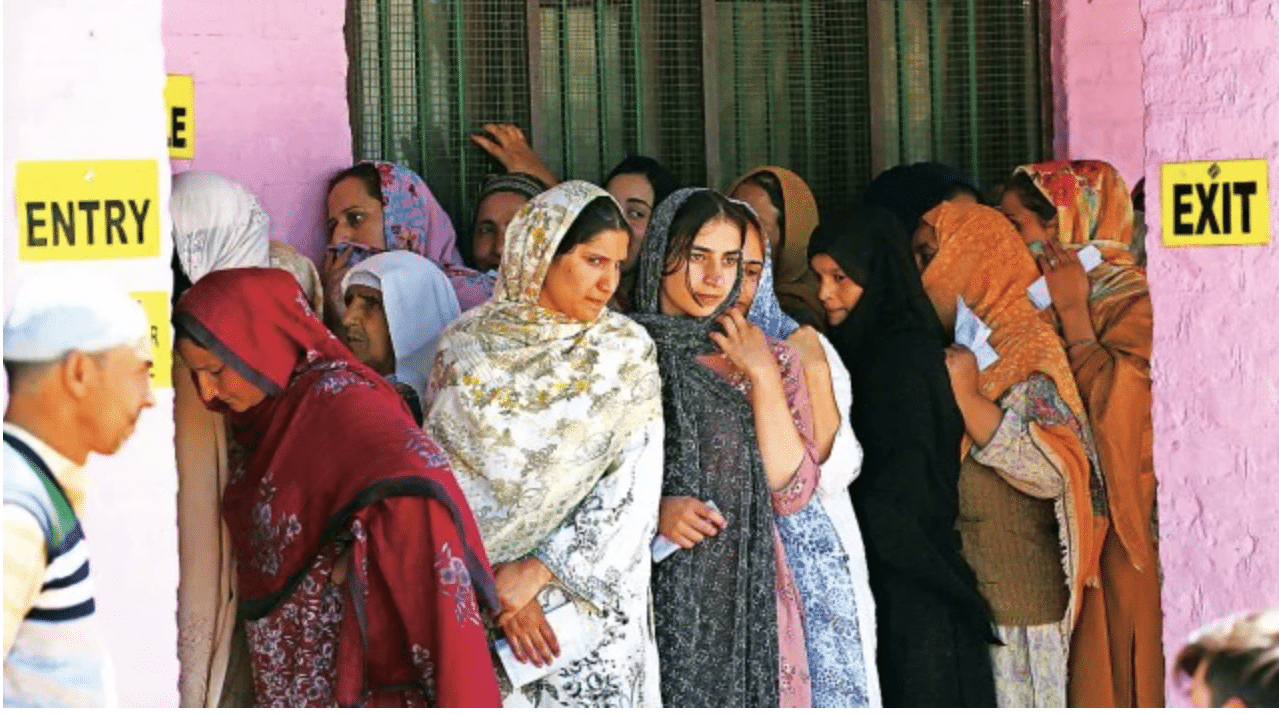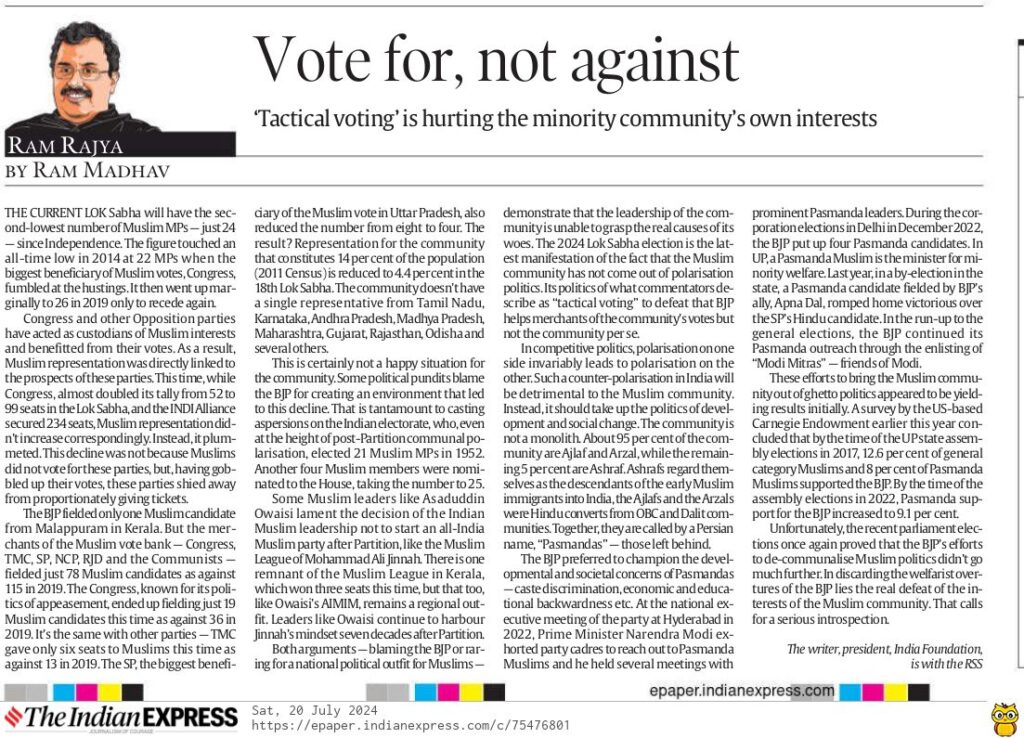
|
Getting your Trinity Audio player ready...
|
(The article was originally published in Indian Express on July 20, 2024 as a part of Dr Madhav’s column titled ‘Ram Rajya’. Views expressed are personal.)
The current Lok Sabha will have the second-lowest number of Muslim MPs — just 24 — since Independence. The figure touched an all-time low in 2014 at 22 MPs when the biggest beneficiary of Muslim votes, Congress, fumbled at the hustings. It then went up marginally to 26 in 2019 only to recede again.
Congress and other Opposition parties have acted as custodians of Muslim interests and benefitted from their votes. As a result, Muslim representation was directly linked to the prospects of these parties. This time, while Congress, almost doubled its tally from 52 to 99 seats in the Lok Sabha, and the INDI Alliance secured 234 seats, Muslim representation didn’t increase correspondingly. Instead, it plummeted. This decline was not because Muslims did not vote for these parties, but, having gobbled up their votes, these parties shied away from proportionately giving tickets.
The BJP fielded only one Muslim candidate from Malappuram in Kerala. But the merchants of the Muslim vote bank — Congress, TMC, SP, NCP, RJD and the Communists — fielded just 78 Muslim candidates as against 115 in 2019. The Congress, known for its politics of appeasement, ended up fielding just 19 Muslim candidates this time as against 36 in 2019. It’s the same with other parties — TMC gave only six seats to Muslims this time as against 13 in 2019. The SP, the biggest beneficiary of the Muslim vote in Uttar Pradesh, also reduced the number from eight to four. The result? Representation for the community that constitutes 14 per cent of the population (2011 Census) is reduced to 4.4 per cent in the 18th Lok Sabha. The community doesn’t have a single representative from Tamil Nadu, Karnataka, Andhra Pradesh, Madhya Pradesh, Maharashtra, Gujarat, Rajasthan, Odisha and several others.
This is certainly not a happy situation for the community. Some political pundits blame the BJP for creating an environment that led to this decline. That is tantamount to casting aspersions on the Indian electorate, who, even at the height of post-Partition communal polarisation, elected 21 Muslim MPs in 1952. Another four Muslim members were nominated to the House, taking the number to 25.
Some Muslim leaders like Asaduddin Owaisi lament the decision of the Indian Muslim leadership not to start an all-India Muslim party after Partition, like the Muslim League of Mohammad Ali Jinnah. There is one remnant of the Muslim League in Kerala, which won three seats this time, but that too, like Owaisi’s AIMIM, remains a regional outfit. Leaders like Owaisi continue to harbour Jinnah’s mindset seven decades after Partition.
Both arguments — blaming the BJP or raring for a national political outfit for Muslims — demonstrate that the leadership of the community is unable to grasp the real causes of its woes. The 2024 Lok Sabha election is the latest manifestation of the fact that the Muslim community has not come out of polarisation politics. Its politics of what commentators describe as “tactical voting” to defeat that BJP helps merchants of the community’s votes but not the community per se.
In competitive politics, polarisation on one side invariably leads to polarisation on the other. Such a counter-polarisation in India will be detrimental to the Muslim community. Instead, it should take up the politics of development and social change. The community is not a monolith. About 95 per cent of the community are Ajlaf and Arzal, while the remaining 5 per cent are Ashraf. Ashrafs regard themselves as the descendants of the early Muslim immigrants into India, the Ajlafs and the Arzals were Hindu converts from OBC and Dalit communities. Together, they are called by a Persian name, “Pasmandas” — those left behind.
The BJP preferred to champion the developmental and societal concerns of Pasmandas — caste discrimination, economic and educational backwardness etc. At the national executive meeting of the party at Hyderabad in 2022, Prime Minister Narendra Modi exhorted party cadres to reach out to Pasmanda Muslims and he held several meetings with prominent Pasmanda leaders. During the corporation elections in Delhi in December 2022, the BJP put up four Pasmanda candidates. In UP, a Pasmanda Muslim is the minister for minority welfare. Last year, in a by-election in the state, a Pasmanda candidate fielded by BJP’s ally, Apna Dal, romped home victorious over the SP’s Hindu candidate. In the run-up to the general elections, the BJP continued its Pasmanda outreach through the enlisting of “Modi Mitras” — friends of Modi.
These efforts to bring the Muslim community out of ghetto politics appeared to be yielding results initially. A survey by the US-based Carnegie Endowment earlier this year concluded that by the time of the UP state assembly elections in 2017, 12.6 per cent of general category Muslims and 8 per cent of Pasmanda Muslims supported the BJP. By the time of the assembly elections in 2022, Pasmanda support for the BJP increased to 9.1 per cent.
Unfortunately, the recent parliament elections once again proved that the BJP’s efforts to de-communalise Muslim politics didn’t go much further. In discarding the welfarist overtures of the BJP lies the real defeat of the interests of the Muslim community. That calls for a serious introspection.




